UPDATED: 11.40AM Thousands gather for Anzac Day services around the country including scores of men and women in uniform.
WATCH: Anzac Day dawn service at Auckland's War Memorial Museum
Today marks the centenary of the first commemoration of Anzac Day on the distant shores of the Gallipoli Peninsula.
Defence Force staff will attend more than 300 events, including the national commemorations in Wellington, where a vigil guard will form at the Tomb of the Unknown Warrior.
MORE: Matiu Workman: Let us remember all this Anzac Day
The growing number of young people attending Anzac Day events is often commented on, and a group of Canterbury students has been trying to find out why.
William Katai said the way younger people interpret Anzac Day is very different to people who've had a direct connection with war.
"For the younger generations it's not so much personally about Gallipoli or just the First World War, it's about war in general. We're exposed nowadays to television and internet."
Veteran Peter Sullivan said it's heartening to see big crowds turning out to Anzac Day events.
He served in Malaya and Borneo in the early sixties, and was up early for today's dawn service in Auckland.
Mr Sullivan said it's important the Anzac story is being told to the next generation.
"I think they're probably being taught more about it because we've been involved in lots of wars."
AUCKLAND
In Auckland this morning men, women and children of all ages began arriving as early as 4.30 on the floodlight museum forecourt.
Tony McDermott took his five year-old son along as he wants him to know exactly what the day is about.
"I think it's very important because it's part of New Zealand's heritage so it's very, very important that he grows up understanding what it means."
Daniel Smith got up at three this morning to make his way from New Lynn to Auckland Domain for the dawn service.
He's been attending for the past 16 years.
"I have no connection at all. I'm Polynesian. It's just out of respect for those who have given their lives, that's all."
Today has been American Kristin Miyake's first Anzac Day commemoration.
She's been living in Auckland for about 18 months and was up early for the service at the War Memorial Museum.
"Very solemn definitely, in respect of all the service men and women who sacrificed their lives. I felt very honoured to be here."
Aucklanders Bruce and Jean MacQueen said it was an especially poignant occasion.
"We both have family members that have fought and now out two children are singing in the Auckland Youth Choir.
"My granddad was in Egypt. I can't put into words what this morning means," said Mrs MacQueen.
The dawn service began with a karakia from Vietnam veteran Miki Apiti.
He said Anzac Day commemorations are very different now to those when he first came back from the war.
"It's awesome. It's really awesome to see the amount of people. There's over a thousand, I would imagine, that's here today."
Chaplin Dr Leon O'Flynn offered prayers saying there's no greater testament of love than when a life is given for another.
He honoured their sacrifice and prayed fallen soldiers will be remembered as family members and friends - not just an abstract memory.
Two Rangitoto College students read an Anzac dedication. One student is on exchange from a Turkish school.
The Turkish teenager said the importance of the message hit home as he spoke to the hushed crowd.
Istanbul exchange student Yigit Can Kaya said he only discovered yesterday he would be addressing the large gathering.
But as he stood on the outdoor podium facing the memorial cenotaph he cast his mind to those young men who had lost their lives in war from his school.
"Taking part and the certainly made me think about the students from our school who fought and died and it made me think it could have been me," said Mr Can Kaya.
The 18-year-old, who has just arrived in the country for a two week-long exchange at Auckland's Rangitoto College, said he was honoured to be selected for the role alongside fellow college student Isabel Corbett.
"I will never forget this day," said Mr Can Kaya.
"I will watch this footage 10 years from now and look back."
Auckland Mayor Len Brown said it is a special, emotional day saying the importance of young for Anzac has not diminished but continues to strengthen as evidenced today.
Mr Brown said in the poignant dawn light we remember the bravest of the brave and express the deepest appreciation for their acts of valour.
The mayor lay a wreath at the foot of the cenotaph.
The lights were then lowered before The Anzac Ode is read first in Maori by Mr Apiti and then in English followed by the Reveille played on the bugle.
A massed youth choir performed the stirring hymn "I vow to thee, my country" followed by both the New Zealand and Australian national anthems.
As the New Zealand national anthem is sung the first rays of morning light peak through the canopy of cloud.
Auckland War Memorial Museum is staying open this morning, and offering free guided tours around its galleries.
There'll be a poppy badge making workshop for children, a poetry competition and a poppy inspired dance by local seniors.
WELLINGTON
Wellington's Pukehau National War Memorial held the Anzac Dawn Service where thousands also attended.
A canon was let off to mark the beginning of the service.
To commemorate 100 years of ANZAC, Wellington resident Fay McGregor took an old army blanket and attached poppies to it last year.
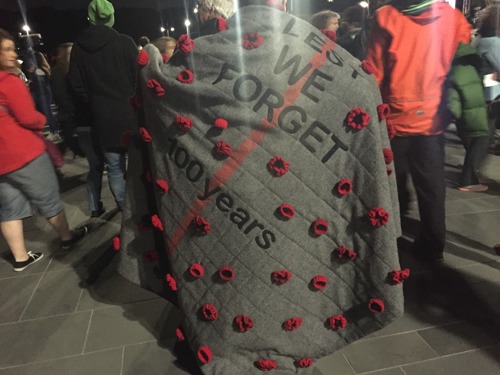
Fay McGregor and her Anzac blanket Photo / Solbin Kang
The words "Least we forget" is also embroidered in.
"It was a really lovely service this morning.
"Last year was really special."
Her husband's great grandfather served in Second World War but was tragically killed.
Graham McColl's father and his father's three brother's all fought in the First World War.

Graham McColl wears his father's medals and his own Order of Merit Photo / Solbin Kang
Mr McColl has attended the dawn service for the past eight years to remember his family who fought the war.
One of Graham's uncle died but the rest survived, he said.
His father later went to England and was a war pensioner for the remainder of his life.
He proudly wore his father's war medals on his right-hand side.
Mr McColl also wore his Order of Merit medal he gained for his services to hospitality at Waikato polytechnic on his left-hand side of his coat.
"It gives me an opportunity to remember my family every year and for the medals to be displayed," he said.
New Zealand Army soldier Tu Phillips bought his son, Rawiri to the dawn service.
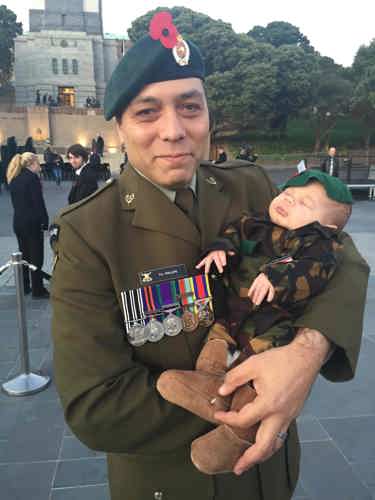
Tu Phillips and his one month old son Rawiri Photo / Solbin Kang
Being one-month-old, it was Rawiri's first service, and he was dressed just like his dad, complete with his dad's medal attached to his camouflage shirt.
"Yeah we'll be taking him to the dawn service every year.
"My dad served in the army in the infantry regiment and I'm wearing his medals as well as mine," said Mr Phillips.
Governor General Sir Jerry Matepere spoke at the service.
SEE ALSO: Key and Sir Jerry's Anzac Day messages
"Up and down the country memorial big and small, New Zealanders will be attending.
"Australians and New Zealanders willl gather at other places around the world at Dawn. It's a sacred ritual," he said.
He said commemorations had renewed interest in our family histories and he spoke about his what his own grandfathers did during the war.
“One of them fought at Gallipoli and then went on to serve on the Western Front. The other also served on the Western Front. Both were wounded, repatriated and medically- discharged before the end of the war.
“New Zealanders may have their origins in very different cultures, speak different languages, and worship in different ways.
“What we all share in our histories is a tragic legacy of armed conflict and war.
“Surely we wish it were otherwise. Surely, our hope is that there will be a time when war and conflict are consigned to history.
“And while this may seem a lofty aspiration, surely it is incumbent on us to pursue it.”
He continued saying New Zealanders engaged in war, 40 years after the land wars.
Let us remember them, he ended.
A wreath was then laid by Sir Jerry, Lady Janine Matepere, the Australian High Commissioner and Turkey ambassador Yesim Say.
A prayer is said: "We thought of those who lost their lives in war and conflict. We pray we may do our duty without fear and favour to fight for justice...
"To all assembled go forward into the world with peace."
John Key has also attended this morning's service in Wellington.
"It's great to see so many New Zealanders from one end of the country to the other to commemorate Anzac Day and particularly pleasing increasing numbers of young people as they take an opportunity to reflect on our history but also to consider our future."
A wreath laying service will be held at 9am at the Cenotaph Precinct, followed by the full National Commemoration at Pukeahu at 11.
The Ataturk Memorial Service will be held at 2.30 this afternoon at the Ataturk Memorial site at Tarakena Bay.
And at 5.30 this evening the Last Post Ceremony will be held back at the National Memorial, followed by a light and sound show remembering the First World War.
HAMILTON
The rain and drizzle has held off as the thousands of locals remembering those who lost their lives stood and gathered at Memorial Park.
The role of cavalry horses in war are to be be remembered at this morning's commemorations in Hamilton.
Mayor Julie Hardaker said 25 horses are joining the parades.
"10,000 horses went from New Zealand and fought and only four returned. Some remained in Europe but many of course were killed or injured."
Julie Hardaker said it's fantastic to see more Hamilton residents attending the services each year, including young families.
She said people of all ethnicities attend Anzac Day services, reflecting the city's diversity.
"And I think that's really important as well. Anzac Day is to commemorate all conflict, and many people who come and resettle in New Zealand come from a place of conflict, so I guess it has a special meaning for them as well."
Alex Falconer, 91, of Taupo, served in the Air Arm fleet during the end of WWII. He usually attends services in Taupo but his family brought up him to the Hamilton service for a change.
Mr Falconer's Hamilton-based daughter Fleur Fink, together with her husband Andrew Fink and their two daughters Alexis, 8, and Ashlyn, 5, were there supporting him along with Mrs Fink's other siblings.
The family make it to every dawn service and are now trying to make the most of the time they have with their father and grandfather.
Hamilton friends Mary Mitchell and Elaine Burns are also regulars at the dawn service.
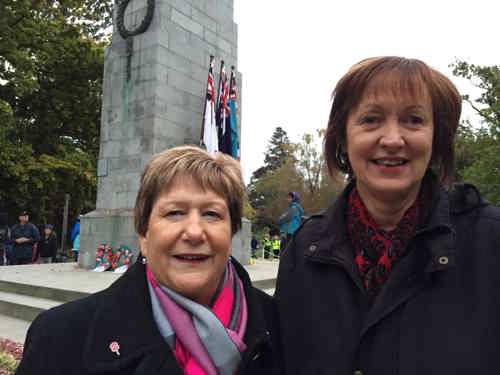
Friends Mary Mitchell and Elaine Burns attend the Hamilton dawn parade every year Photo / Belinda Feek
Mrs Mitchell said her father - who has since died - was a returned serviceman from WWII.
"He mostly fought in Egypt and Italy and he did most of his training in Fiji. He was born in the Wairarapa but he moved up to Raglan after the war and worked on the farm up here and met my mum.
"It's a very poignant day for me today, I always love to come," Mrs Mitchell said.
Hamilton's Don Macdonald, and wife Marian, try and make the dawn service.
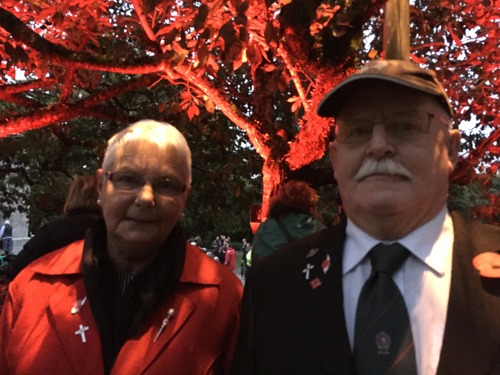
Marian and Don Macdonald Photo / Belinda Feek
Mr Macdonald served in the army for five years from 1970 to 1975, while Mrs Macdonald's father and grandfather served in the second and first world wars respectively.
"It's a wonderful thing and if it wasn't for them we wouldn't be where we were today," Mrs Macdonald said.
CHRISTCHURCH
Anzac Day in Christchurch is being marked with the planting of a seedling from the original Gallipoli Lone Pine.
The tiny tree has been gifted by a Crown Research Institute, which propagated 50 of them to be distributed around the country today.
Five of them are now planted in the South Island.
In addition, this Anzac Day is very special in Christchurch with the Bridge of Remembrance reopening.
It was badly damaged during the Christchurch earthquakes.
Deputy Director of Christchurch Central Development Unit Greg Wilson told Chris Lynch a lot of people have put in long hours to restore the landmark.
"I'm very pleased to have it completed in time for Anzac Day. It's very important that future generations remember the service of others that have gone past, particularly World War One and World War Two veterans and wars before and since that time so I think it's very fitting that we do remember."
More than 1600 white crosses have been placed in the square, representing the number of Cantabrians so far killed in the war a century ago.
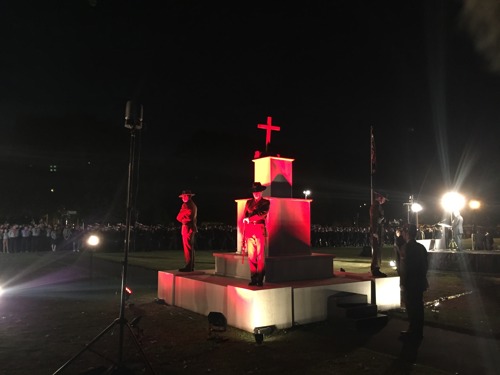
Christchurch's Cranmer Square cenotaph Photo / Kurt Bayer
There will be hundreds more at next year's service, in memory of those killed on the Western Front in 1916, especially at the infamous Battle of the Somme.
Thousands gathered in Christchurch's Cranmer Square for the dawn service where Christchurch Mayor Lianne Dalziel welcomed and urged them to remember those who gathered a century ago and to share in their sense of loss.
Second World War veteran Bill Mitchell, 103, lead a march by returned and service personnel from the Christchurch Returned and Services Association (RSA) on Armagh St.
Mr Mitchell, who served with the RNZAF as an aircraft engineer in the Pacific, will be driven in a US jeep at the head of the parade alongside the New Zealand Army Band.
Five generations of his family joined him at the service.
He said today is an occasion to remember those next to him and those who can't be.
"Well it's hit pretty deep hasn't it. Never been forgotten and the young ones just love to see them, and the old ones."
Denise Pearce is in the crowd at Cranmer Square, wearing her father’s medals.
"It's very important. This is the 70th year I've been to dawn parade. Mum brought me as a baby."
New Zealand Army Band got a round of applause after performing Dave Dobbyn's Welcome Home which was sung at Chunuk Bair at last year's centenary commemorations at Gallipoli.
Warrant Officer Jamie Osbourne gave an emotional address on behalf of Australia remembering all service people during all wars and conflicts of the last century.
TARANAKI
In the South Taranaki town of Hawera, a big crowd joined the parade to the Cenotaph.
Local MP Chester Borrows said it's been a cool brisk morning, but that hasn't deterred people at all.
"In our little town about 10 per cent of the population turnout. Each year the crowd seems to grow. 700 people turning out for a dawn service that early in the morning and the remarkable thing is the growing number of young people who are coming out."
ROTORUA
In Rotorua, large crowds gathered at the Muruika War Cemetery at Ohinemutu, some wrapped in blankets. Among them were many children and teenagers.
Rotorua local Angela Swann-Cronin became the first Maori woman to give an Anzac address. She spoke of her great-great grandfather who was killed in the Battle of Somb 1916.
TAURANGA
Several turned up for a dawn service at Tauranga’s Returned Services' Association cenotaph.
And in Mount Maunganui, hundreds of people gathered at the Cenotaph on Marine Parade to pay their respects, including two husky dogs wearing poppies.
Large crowds spilled onto the streets. A parade of about 200 former servicemen and associates marched from Mauao to the Cenotaph to honour and commemorate our fallen soldiers.
COROMANDEL
An estimated 400 people who turned out for Whangamata's second dawn service at the beach. The sight of the New Zealand and Australian flags being brought ashore in lifeboats brought an emotional lump to a throat or two.
In a modern-day replication of the landings at Normandy, the lifeguards leapt ashore carrying, not weapons but the flags of peace, and handed them to Whangamata Area School's head girl and boy.
Earlier, RSA chaplain Deacon Terri Sorenson remembered those who had passed in major conflicts.
Royal New Zealand Navy Lieutenant Jerry Kemp said today was the 100th year since Anzac Day was first commemorated.
"This year also marks the 100th year since the New Zealand Expeditionary Force arrived on the Western front. Commemorations will be held in France and Belgium on September 15.
"The Western Front claimed 82 per cent of New Zealand's casualties in that war," Lt Kemp said.
He referred to the closs alliance forged between the Kiwis and Australians during World War I - "and that alliance continues today".
WAIHI
Hundreds of people woke up to attend the 6am service at the Waihi Beach RSA.
Guest speaker Captain (Rtd) Rex Williams Harris saw active service in Malaysia and Borneo between 1959 and 1966 which included two years with the New Zealand Special Air Service (SAS). He began his career as an Infantry non-commissioned soldier and completed 32 years' service retiring in 1985 in the rank of Captain.
"I am not giving you a lesson of history, I am going to talk about our family," he started.
One of his great uncles, Joshua Thomas Cuff joined the New Zealand Field Artillery on August 15, 1914, and eventually ended up in Gallipoli as a gunner.
"All soldiers in the New Zealand division were in and out of the line for 10 days. When you came out of the line you were given another task to do whether It was digging tunnels, trench digging, fighting, reinforcing, retraining and going back into the battle again.
"Life was tough, life was hard, life was fearful."
"Whoever you were in the war you keep your head down. I have been keeping my head down ever since."
Thirteen-year-old Hamilton high school student and bugler Hamish Templeton closed the service.
He said he has been playing bugle for the past five years.
"It came naturally to me to play at Anzac because my dad was in the army."
KATIKATI
Hundreds in Katikati were greeted to a brisk, clear morning today to mark Anzac Day.
Katikati RSA President Peter MacKay Due welcomed a large crowd of more than 500 to the commemoration. He told the crowd there were two new pieces at the Square - a Memorial Stone and a mural of a soldier - to "remind us of our fallen."
Mr MacKay also acknowledged a contingent from the naval vessel HMNZS Hawea, which is in Tauranga as part of the Royal New Zealand Navy's 75th Anniversary and Anzac Day commemorations.Hundreds in Katikati were greeted to a brisk, clear morning today to mark Anzac Day - a day when thousands of young men, far from their homes, stormed the beaches on the Gallipoli Peninsula.
WHANGAREI
More than 1000 students, youth and scout groups were among an estimated 7000 that gathered for the Anzac Day dawn service in Whangarei, which was performed for the second time on a pleasant morning at the new cenotaph at Laurie Hall Park today.
Chief guest was Commodore Dave Gibbs, deputy chief of the Royal New Zealand Navy.
Whangarei mayor Sheryl Mai was the first to lay a wreath at the cenotaph followed by Whangarei RSA president Chris Harold and the RSA Trust chairman Archie Dixon.
Mr Harold said those ex-servicemen buried at sea and at cemeteries throughout the world were held in high esteem and they must always be honoured.
He said people must realise that those who fought at Gallipoli in April 1915 were not only Kiwis and Australian fighters but were also from Britain, France and Turkey.
“If you ever get a chance to visit Gallipoli, do go there. What they faced during the war will bring you to tears,” he said.
DUNEDIN
More than 10,000 huddled together on a brisk Dunedin morning at Queen's Gardens.
As the service concluded and the crowd dispersed, it was 6-year-old Erika Reilly, wearing her great-great grandfather's World War 2 medals, who summed the morning up best.
''It was awesome,'' she said.
Led by a City of Dunedin Pipe Band lone piper and a 2/4 RNZIR Maori warrior, the colours were laid at the cenotaph and a moving service followed as the crowd watched on, their minds wandering often to the fate of their ancestors.
New Zealand Defence Force (NZDF) officiating Chaplin Rev Dr Tony Martin led the service.
''The horror of war impacts everybody and no-one hates war more than those that have served,'' he said.
''For your tomorrows we give our today.''
Columba College head girl Alice Jones and John McGlashan College head boy Lochie Chittock gave well-spoken readings before guest speaker NZDF director of defence strategic relationships Commodore John Campbell, of Auckland, spoke on the importance of today.
Dunedin RSA president Major (retired) Lox Kellas addressed the crowd, saying it was important to reflect on those who did not return from war.
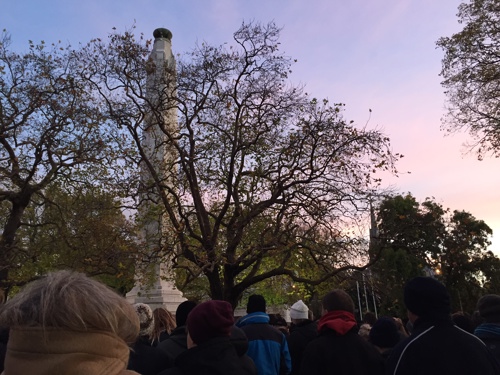
Dawn service at Queen's Garden cenotaph in Dunedin Photo / Matiu Workman
Dunedin kaumatua David Ellison wrapped up in his korowai for this morning's service, expecting cold weather.
His father was in the Maori Battalion, and was captured and held as a POW in Greece for four years.
He said attending the service is one of the most important days of the year for him.
"I'm glad today wasn't just talking about remembering those that had past. We were remembering also their families and hopefully an end to all wars which is of course what all soldiers want. They don't want war at all."
James Aiken took his four year-old daughter Rosie to the Dunedin event.
"I think it's important to teach the kids of today what's happened in the past. We'll never forget, but we've got to teach these kids not to forget either."
WHANGANUI
On an unusually mild autumn day those who marched to the War Memorial Centre forecourt in Whanganui were encircled by hundreds of others flanking the forecourt in front of the hall and the museum. Still others found vantage points along on Queens Park above the memorial steps.
Mayor Annette Main and Mr Morris led the wreath-laying ceremony, followed by Returned and Services personnel, defence forces, schools and rest homes.
Whanganui City College student Finn Williams gave the address, his speech focusing on the enormity of the casualties from the ill-fated Gallipoli campaign in 1915.
"But this day is not about bloodshed. It's about the people who bravely fought for what they believed in," he said.
He said the casualties suffered on both sides of the conflict were horrendous.
"This is a day when we, as a country, feel great pride in what we achieved in those nine months, rather than hang our heads in remorse of the sacrifice made to achieve them."
Reverend Rosemary Anderson said the reality of combat is that the participants were constantly facing death.
"Those who have never experienced combat can never fully comprehend the toll it takes and that's why it falls to us to remember their sacrifices," Mrs Anderson said.
"We stand here in honour of them, as we do every year, to reflect and remember that they gave their tomorrows so that we can have our todays."
And with the singing of "God Save the Queen", "Advance Australia Fair" and "God Defend New Zealand", the parade was dismissed.
Some headed into the War Memorial Centre for the traditional rum and coffee.
HAWKE'S BAY
At the Dawn Service in Napier, staged at the Sound Shell, the colonnade area was packed as were nearby footpaths and a large stretch of the closed-off northern end of Marine Parade.
One of the guest speakers at the service, Royal New Zealand Navy Commodore David Proctor, paused briefly before his address and looked toward the sea.
"We see the awesome sunrises of the Bay - and we remember the Gallipoli sunrise."
He spoke of the mateship and comradeship of the services, and how they were strongly embraced today by families and communities - that was evident looking out across the faces in the crowd, which some estimated to be about 6000 strong.
All ages were represented.
Toddlers, some in push-chairs, children, teenagers, young and old - and the poppies were clearly evident.
New Zealand Army Colonel Ian MacDonald told of how while at Gallipoli for last year's centennial commemorations he saw for himself the harshness of the conditions - "where they lived, fought and died".
He also spoke of the remarkable bond which war had woven between the people of New Zealand and the people of Turkey.
As Colonel MacDonald spoke the glow on the horizon drew out the silhouette of the waka which sailed in close to shore and at the conclusion of the services carried out a traditional salute - opening and closing the sails and blowing of the pukaea/conch.
Mark Gregg, visiting from Australia, described the service and the glowing sunrise over the sea as "something I will never forget - it was just lump in the throat stuff, it really was".
There were also big early morning crowds for the service at the Hastings Cenotaph and the Lone Pine Memorial in Taradale.
Take your Radio, Podcasts and Music with you









